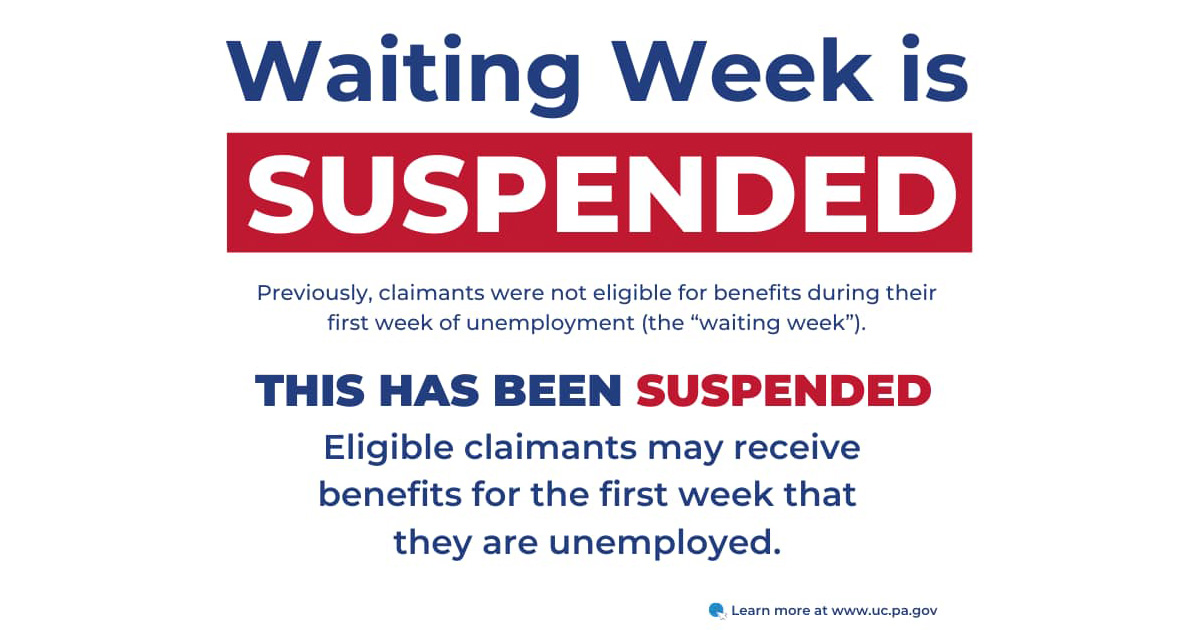
by Christin Brown | Marzo 17, 2020 | News Releases
Las disposiciones de la Ley de Compensación por Desempleo de Pensilvania se flexibilizarán mientras dure la Emergencia COVID-19 para ayudar a los trabajadores desplazados por la pandemia.
Filadelfia, PA, 17 de marzo de 2020 - La senadora estatal Christine Tartaglione (D-Filadelfia) da la bienvenida a la directiva del gobernador Tom Wolf para relajar el período de espera, el registro de trabajo y los requisitos de búsqueda de trabajo para los residentes de Pensilvania que solicitan beneficios de compensación por desempleo durante la pandemia de COVID-19 (enfermedad por coronavirus).
Wolf ha dado instrucciones al Departamento de Trabajo e Industria para suspender el requisito de la semana de espera en la Sección 401 (e) de la Ley de Compensación por Desempleo de Pensilvania. Como resultado, la primera semana de desempleo de un trabajador será compensable. Esta suspensión se mantendrá en vigor durante la duración de la declaración de emergencia por desastre del gobernador de COVID-19.
El gobernador también ha ordenado al departamento que suspenda los requisitos de registro y búsqueda de trabajo. Estas medidas también seguirán en vigor mientras dure la emergencia por catástrofe.
"A medida que las empresas de toda la Commonwealth toman la difícil pero necesaria decisión de cerrar o reducir sus operaciones temporalmente en respuesta a la emergencia de salud pública, muchos trabajadores se encuentran de repente sin ingresos y preguntándose cómo van a pagar sus facturas", dijo el senador Tartaglione. "Las medidas iniciadas por el gobernador permitirán a estos ciudadanos de Pensilvania cobrar antes la indemnización por desempleo y les ayudarán a proteger su bienestar financiero, así como su salud física."
La Ley de Compensación por Desempleo de Pensilvania permite a los empleadores ser eximidos de los cargos por compensación una vez que ha habido una declaración federal de desastre bajo la Ley Stafford y los solicitantes individuales habrían sido elegibles para la Asistencia de Desempleo por Desastre. Por lo tanto, un empresario puede quedar exonerado de los gastos de indemnización abonados a una persona en relación con cualquier semana de desempleo que se produzca debido a la COVID-19.
El sitio web de Indemnización por Desempleo ofrece información actualizada para los trabajadores afectados por la COVID-19. Los trabajadores pueden optar a una indemnización si la empresa cierra temporal o permanentemente o si el empleado experimenta una reducción de jornada. Los trabajadores desplazados pueden solicitar la indemnización en línea.
# # #
Si desea más información sobre este tema, póngase en contacto con William Kenny en el 215-533-0440 o en [email protected].
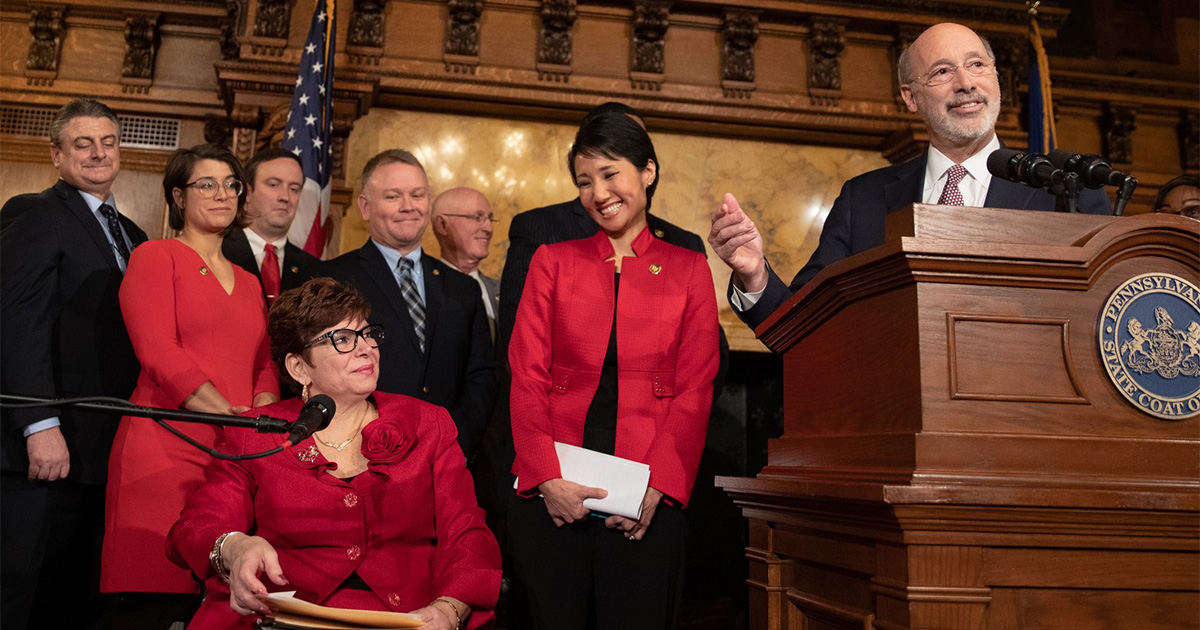
by Christin Brown | Marzo 13, 2020 | News Releases
Philadelphia, PA, Marzo 13, 2020 – State Senator Christine Tartaglione (D-Philadelphia) today issued the following statement regarding the comprehensive response of the Governor Wolf administration to the COVID-19/coronavirus pandemic:
“As we all continue to monitor the steady stream of reports regarding coronavirus and its impact on our families and communities, I’d like to take a moment to recognize the diligent and effective work being performed by the Wolf administration in collaboration with the medical community to minimize the health risks for all Pennsylvanians. From the outset, the administration has provided us with detailed real-time information about the proliferation of the virus and measures we must take to prevent it. I highly recommend using the Pennsylvania Department of Health website as a primary resource for the latest updates.”
# # #
Si desea más información sobre este tema, póngase en contacto con William Kenny en el 215-533-0440 o en [email protected].
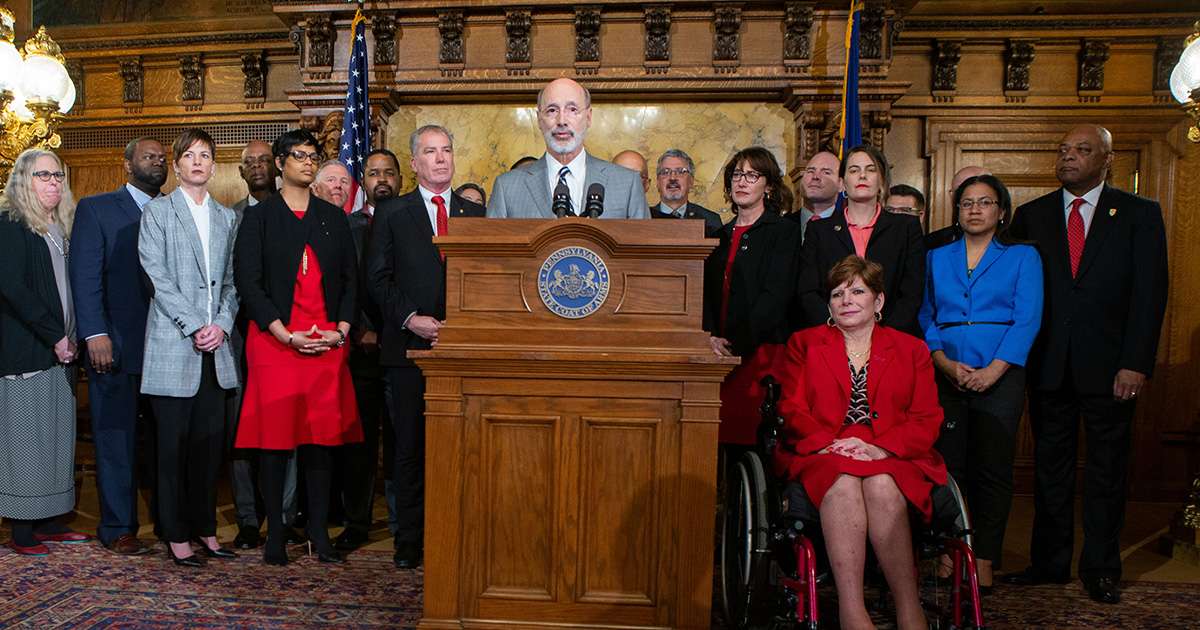
by Christin Brown | Enero 30, 2020 | News Releases
La detección y el saneamiento del amianto y la pintura con plomo serán dos de los ámbitos en los que se centrarán las inversiones específicas a escala estatal en escuelas, guarderías, hogares y sistemas públicos de abastecimiento de agua.
Harrisburg, PA, 30 de enero de 2020 - La senadora estatal Christine Tartaglione (D-Filadelfia) se unió ayer al gobernador Tom Wolf y muchos de sus colegas legislativos para anunciar una propuesta de financiación combinada estatal y federal de $ 1.1 mil millones para la remediación de materiales tóxicos, incluyendo el amianto y el plomo de las escuelas de Pensilvania, guarderías, hogares y sistemas públicos de agua.
La mayor parte de la propuesta consiste en una inversión de hasta 1.000 millones de dólares en oportunidades de subvención del Programa de Capital de Ayuda a la Reurbanización para escuelas envejecidas de todo el Estado en las que las toxinas amenazan la salud de los alumnos, los profesores, el personal y los miembros de la comunidad que visitan las instalaciones.
"Se trata de un compromiso oportuno y significativo con los estudiantes y educadores de Pensilvania, una inversión de gran alcance e integral en nuestros edificios escolares envejecidos", dijo el senador Tartaglione. "Hay una necesidad urgente de estos recursos porque con cada semana, cada día y cada hora que pasa, innumerables personas pueden estar expuestas a sustancias tóxicas no detectadas".
El gobernador también propuso movilizar 4 millones de dólares de fondos estatales para obtener 10 millones adicionales de fondos federales a través de la Iniciativa de Servicios de Salud (HSI), una colaboración en la que participan el Departamento de Servicios Humanos y los Centros de Servicios de Medicare y Medicaid para remediar el plomo en lugares donde los niños han estado expuestos a altos niveles de esta sustancia nociva.
Además, el gobernador propuso emplear la legislación federal recientemente adoptada que permite a los estados transferir dólares de sus asignaciones de fondos rotatorios estatales de agua limpia a sus fondos rotatorios estatales de agua potable. De este modo se podrían liberar hasta 90 millones de dólares en subvenciones de la Autoridad de Inversión en Infraestructuras de Pensilvania (PENNVEST) para la sustitución de tuberías de servicio de agua con plomo.
Para hacer frente a los peligros de la pintura a base de plomo relacionados con la vivienda, Pensilvania y varias comunidades locales del estado han recibido 22,5 millones de dólares en subvenciones a través del Programa federal de reducción de los peligros de la pintura a base de plomo desde el pasado mes de septiembre. El gobernador ha propuesto convocar una mesa redonda de estos beneficiarios coordinada por el Departamento de Salud del estado para garantizar la colaboración en la ejecución de sus proyectos de reducción del peligro.
Por último, la administración Wolf ha solicitado a la Agencia de Protección del Medio Ambiente de EE.UU. (EPA) una subvención de 1,7 millones de dólares para el Programa de Pruebas de Plomo en el Agua Potable de Escuelas y Guarderías. La EPA no ha anunciado los beneficiarios del programa. La financiación apoyaría las pruebas ambientales en 3.000 escuelas de Pensilvania y guarderías.
En los últimos meses, el senador Tartaglione ha trabajado en estrecha colaboración con las partes interesadas de las escuelas públicas de Filadelfia y de toda la Commonwealth para desarrollar soluciones al omnipresente problema de las escuelas tóxicas.
Seis escuelas públicas de Filadelfia, entre ellas varias del distrito del senador Tartaglione, han tenido que cerrar para realizar reparaciones de emergencia este curso académico después de que las pruebas medioambientales revelaran la presencia de amianto peligroso. Una escuela primaria estuvo cerrada durante más de tres semanas, se declaró segura para su reapertura y se volvió a cerrar sólo dos días después, cuando se detectó amianto adicional.
"Sabemos que hasta finales de la década de 1970, el amianto se utilizaba habitualmente en la construcción de escuelas. En Filadelfia y en comunidades de todos los tamaños en todo el estado, la mayoría de las escuelas entran en esa categoría", dijo el senador Tartaglione. "Conocemos la amenaza. El miedo es lo que desconocemos. Los expertos nos dicen que pueden pasar años, incluso décadas, después de que alguien esté expuesto al amianto para que afloren enfermedades dañinas y a menudo mortales."
A principios de este mes, el senador Tartaglione convocó una cumbre de cargos electos locales, estatales y federales, líderes sindicales y responsables de escuelas públicas en la que los participantes intercambiaron conocimientos e ideas sobre el tema.
"Nuestras conversaciones de entonces y las que he mantenido con diversas partes interesadas desde entonces reafirman que no se trata sólo de un asunto de Filadelfia, de un asunto demócrata o republicano, o de un asunto urbano o rural", dijo el senador Tartaglione. "Es una cuestión que afecta a todos los ciudadanos de Pensilvania. Proteger la salud de nuestros escolares, profesores, personal y administradores debe ser nuestra máxima prioridad a medida que cumplimos con nuestra obligación constitucional de proporcionar a todos los niños acceso a una educación pública igualitaria y segura. Hemos heredado una pesada carga, y todos tenemos un papel que desempeñar para soportarla".
# # #
Si desea más información sobre este tema, póngase en contacto con William Kenny en el 215-533-0440 o en [email protected].
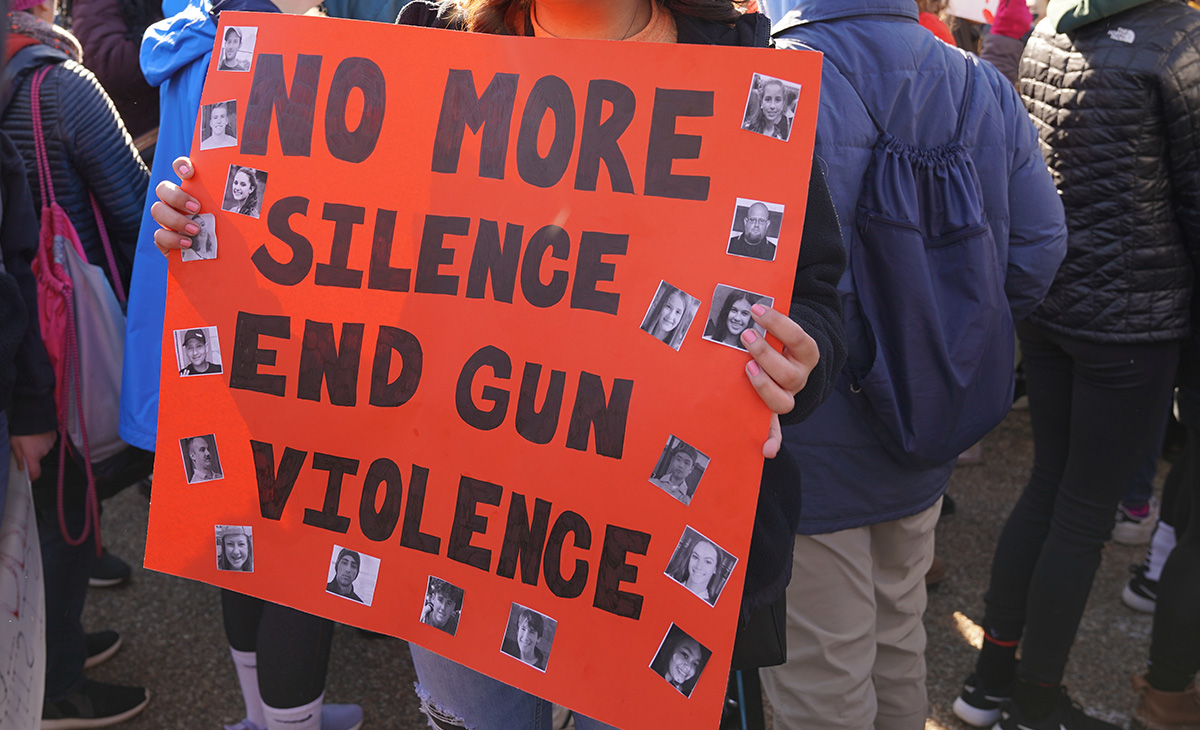
by Christin Brown | Junio 24, 2019 | News Releases
Harrisburg, Pa. − Junio 24, 2019 − Members of the Pennsylvania Senate Democratic Caucus today jointly sent a letter to Governor Tom Wolf requesting a disaster declaration for gun violence in the Commonwealth.
“We believe it is necessary to raise the public’s awareness of the massive loss of human life and the suffering inflicted on affected family, friends and neighbors where this tragedy is unfolding daily,” they wrote. “Just as you have signed six disaster declarations to provide every tool at the Commonwealth’s disposal to combat the opioid epidemic, the death toll and impact from illegal guns should merit immediate and coordinated attention.”
Specifically, a disaster declaration could do the following:
- Establish a task force led by the Department of Health to create and implement a public health framework for addressing gun violence
- Establish a command center in the Pennsylvania Emergency Management Agency to coordinate state and local law enforcement response
- Enhance the Joint-Local State Firearm Taskforce through additional personnel and funding to take illegal guns off the street
- Expand information gathering and sharing between all levels of law enforcement and community groups
- Increase law enforcement presence, both local and state, in targeted areas where gun violence is most prevalent
- Expedite and expand grants and other funding sources for community groups and nonprofit associations with a proven record of violence reduction and prevention
- Provide additional state resources for behavioral and mental health
- Bringing to bear the significant wealth of knowledge and experience in the Departments of Health and Human Services to provide de-escalation and de-confliction training throughout the community
- Require the Pennsylvania Department of Education provide training and professional development on trauma-informed education
View full letter →
###

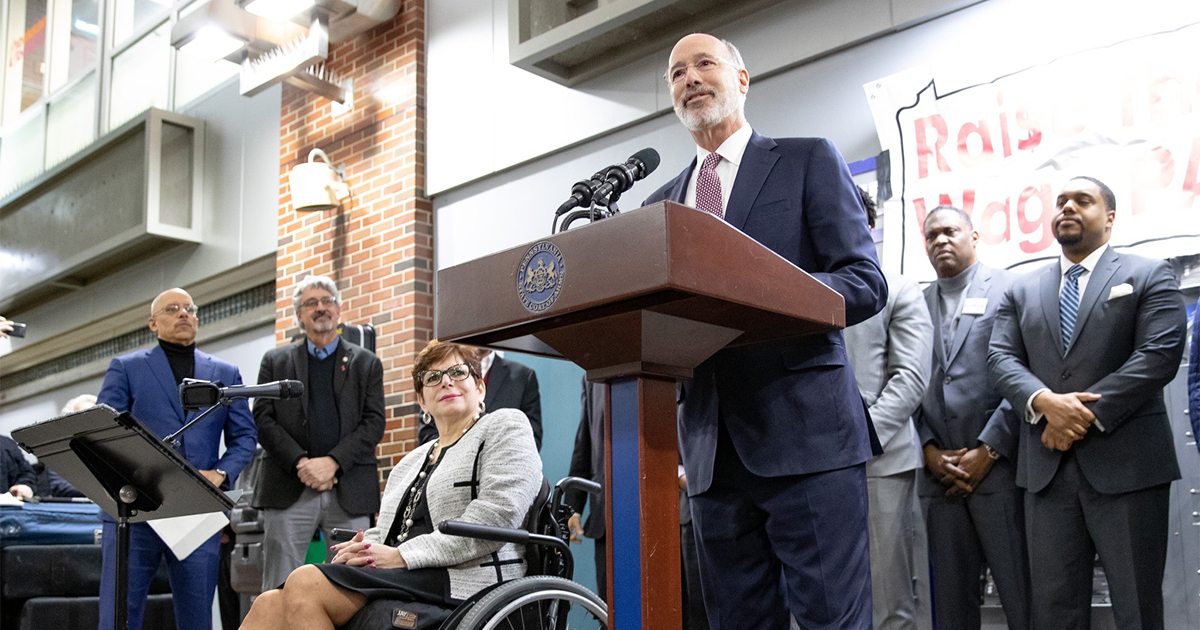
by Christin Brown | Febrero 8, 2019 | Minimum Wage, News Releases
Philadelphia Mayor Jim Kenney, numerous elected officials, labor leaders, and commuters gathered at Frankford Terminal to join the call for a living wage
PHILADELPHIA, PA, Febrero 8, 2019 – State Sen. Christine M. Tartaglione (D-Philadelphia) and Pennsylvania Gov. Tom Wolf led a coalition of elected officials, labor leaders, worker advocates, and commuters at the bustling Frankford Transportation Center today to rally support for a long overdue raise in Pennsylvania’s minimum wage.
It’s been 13 years since the legislature last raised the state’s minimum wage, and a decade since the federal government’s last minimum wage increase. Pennsylvania workers have been subject to a $7.25 minimum wage since then. At that rate, a 40-hour-per-week worker would earn just $15,080 per year. That’s barely above the federal poverty level for an individual, and about $1,400 below the poverty level for a two-person household.
“Let’s be clear about the people who we’re going to help by raising the minimum wage,” Sen. Tartaglione said. “It’s not just the teenagers who work at fast food restaurants, convenience stores, and other part-time, entry level jobs. The overwhelming majority of those who would see their paychecks get bigger – 90 percent in fact – are in their 20s or older. And half of them are full-time workers. On average, these folks earn more than half of their family’s total income.”
Numerous elected officials joined Tartaglione and the governor for the high-energy rally, including Philadelphia Mayor Jim Kenney and Tartaglione’s Senate colleagues Vincent Hughes, Art Haywood, and Tim Kearney. Wolf and Tartaglione each detailed the minimum wage proposal that the senator will soon introduce as Senate Bill 12.
“Twenty-nine states and the District of Columbia have raised their minimum wages above the federal minimum. New raises took effect in 18 states just last month,” Sen. Tartaglione said.
The legislation would raise the minimum wage from $7.25 to $12 this year, followed by annual increases of 50 cents until it reaches $15 in 2025. After then, the minimum wage would be adjusted annually, automatically, based on the cost of living. The legislation would also create safeguards to protect workers from employers who willfully underpay.
“I’ve said it before, I’ll say it today, and I’ll keep saying it – it’s past time that we raise the wage in Pennsylvania,” Gov. Wolf said. “Pennsylvania must be a place where hard work is rewarded, but our minimum wage hasn’t changed in a decade and too many hardworking people are struggling to get by. We must raise the wage.”
Raising the minimum wage to $12 this year would directly benefit more than one million workers, most of whom make more than the current minimum wage, but less than $12.
“This raise would put more money into their pockets, helping them to pay their bills,” Sen. Tartaglione said. “And it would inject billions of consumer dollars into our economy.”
# # #
If you would like more information about this topic, please contact William Kenny at 215-533-0440 or email at [email protected]
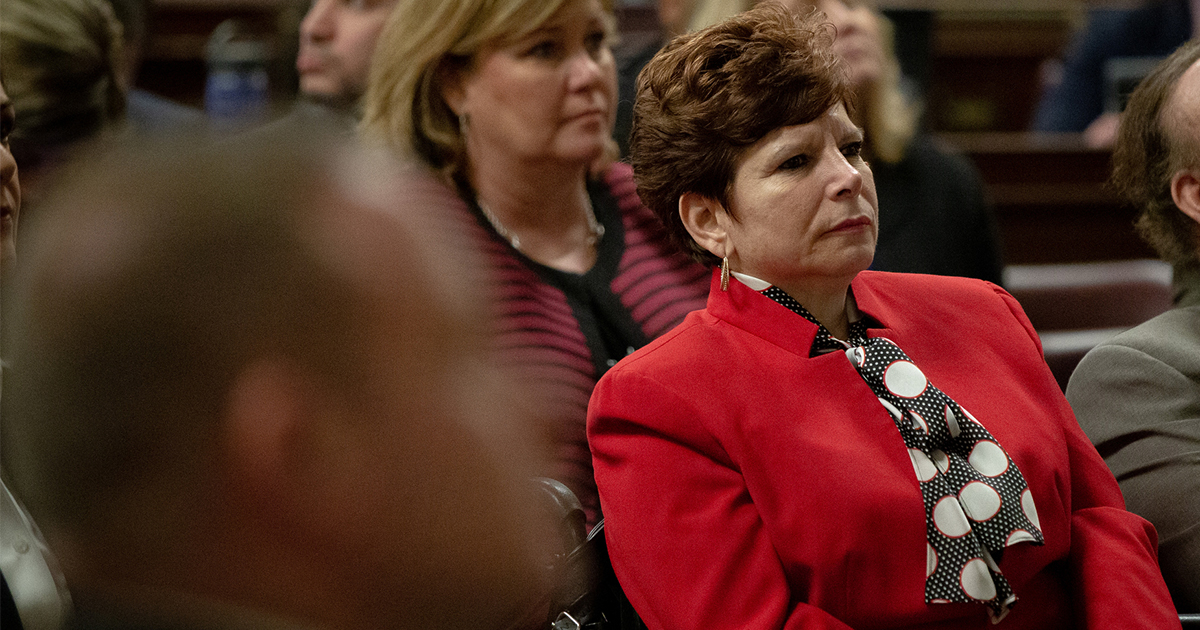
by Christin Brown | Febrero 5, 2019 | News Releases
During his annual budget address, Gov. Tom Wolf shared his plan to build ‘the strongest workforce in the nation’ in Pennsylvania while proposing no tax increases.
HARRISBURG, PA, Febrero 5, 2019 – State Sen. Christine M. Tartaglione (D-Philadelphia) today declared her enthusiastic support for Gov. Tom Wolf’s proposed Fiscal 2019-2020 budget as detailed by the governor in his annual budget address before a joint session of the Pennsylvania legislature.
Tartaglione, who is the longtime minority chair of the Senate’s Labor & Industry Committee, agreed with the governor that the path toward prosperity throughout the Commonwealth is through the education and training of Pennsylvanians to prepare them for the jobs of the present and the future.
“I applaud Governor Wolf for striving to build upon Pennsylvania’s many recent successes by continuing to grow and integrate our workforce development initiatives, while increasing our investment in education,” Tartaglione said.
In his remarks, Wolf named his package of policies and investments as the Statewide Workforce, Education, and Accountability Program. He identified the new Keystone Economic Development and Workforce Command Center as one of the program’s key components. The center will provide a forum for members of the governor’s cabinet to collaborate with business and labor leaders on efforts to train workers and prepare them to satisfy the industry’s workforce needs. Wolf said his goal for Pennsylvania is “building the strongest workforce in the nation.”
“As a Commonwealth, we face many great challenges,” Tartaglione said. “How do we ensure that our residents can support their families with a living wage? How do we give them access to affordable healthcare? How do we help people escape the downward spiral of addiction? And how do we provide businesses – both established and emerging ones – with the human resources they need to thrive and to bolster our economy? The answer to all of these questions is by strengthening our workforce,” Tartaglione said.
Wolf proposes to increase funding for basic education by $200 million, pre-K and Head Start by $50 million, and special education by $50 million, as well as an additional $7 million for the State System of Higher Education and $8 million for one-time grants to college graduates who remain in Pennsylvania to work.
The governor proposes $10 million in funding to extend the PAsmart program that he initiated last year to support the expansion of career training, apprenticeships, and STEM education. He also proposes to invest $5 million in home-visiting programs for pregnant women and $5 million for wrap-around services so that parents can attend college or skills training that will enable them to secure family-sustaining jobs. Those state investments would be in addition to the allocation of $15 million in federal funds to reduce waiting lists for high-quality child care.
Taxes will not be raised under his plan. Rather, Wolf said his administration has already saved taxpayers billions of dollars by streamlining state government. It has reduced the number of state employees without resorting to furloughs and combined government functions where appropriate, while preserving and improving the services it provides.
Wolf’s budget proposal also includes a projected $120 million reduction in the demand for public assistance that would result from raising the minimum wage from $7.25 per hour to $12 this year. In the days leading up to his budget address, Wolf outlined the new minimum wage plan in collaboration with Senator Tartaglione and other lawmakers. Under the plan, the minimum wage would increase further in annual increments of 50 cents per year leading to a $15 level by 2025. After then, the minimum wage would be adjusted automatically each year based on the cost of living.
Senator Tartaglione plans to introduce the minimum wage plan as Senate Bill 12 in the near future.
Late last week, Wolf also announced a plan separate from his proposed budget to apply a new severance tax on natural gas extracted in Pennsylvania toward comprehensive infrastructure improvements across the Commonwealth, including hi-speed internet networks, storm preparedness and disaster recovery measures, blight and brownfields rehabilitation, and energy-efficient site development for businesses and residential projects.
“Raising the minimum wage and launching much-needed, job-generating infrastructure projects are measures we can adopt now to improve the economic condition of Pennsylvania, and the financial condition of millions of its workers,” Tartaglione said.
# # #
Si desea más información sobre este tema, póngase en contacto con William Kenny en el 215-533-0440 o por correo electrónico en [email protected].

by Christin Brown | Enero 30, 2019 | Minimum Wage, News Releases
In collaboration with the governor and state Rep. Patty Kim, the senator will introduce legislation that will directly help more than one-third of Pennsylvania’s workers.
HARRISBURG, PA, Enero 30, 2019 – State Sen. Christine M. Tartaglione (D-Philadelphia) today joined Gov. Tom Wolf, state Rep. Patty Kim, many of their legislative colleagues, and many worker advocates to announce their plan to raise Pennsylvania’s outdated minimum wage, which has stagnated at just over $7 per hour for the last 12 years.
Under the new proposal, Pennsylvania’s minimum wage would rise from the federal minimum of $7.25 to $12 on Julio 1, 2019. It would then increase an additional 50 cents per year until reaching $15 in 2025, after which it would be linked to annual cost of living adjustments. Tartaglione will soon introduce this plan as legislation in the Senate, while Kim will introduce it in the House.
“Minimum wage is one of the most important issues facing us as elected officials and as a Commonwealth because it directly impacts so many of our constituents. Enacting our legislation would give raises to 2.1 million Pennsylvanians, who represent 37 percent of the total workforce,” Sen. Tartaglione said, quoting data compiled by the Keystone Research Center.
Inflation has grown by more than 20 percent nationwide in the last dozen years, according to the Bureau of Labor Statistics, and 29 states, along with the District of Columbia, have raised their minimum wages above the federal minimum – including California and Washington at $12, and New York at $11.10.
New minimum wage raises took effect in 21 states this month, and New Jersey lawmakers are planning to vote tomorrow on a plan to raise that state’s minimum wage to $15 over the next five years. All six of Pennsylvania’s neighboring states have higher minimum wages than the $7.25 in effect throughout the Commonwealth.
 “Raising the Minimum Wage is long overdue. I know this because I sponsored Pennsylvania’s last successful Minimum Wage legislation in 2006,” Sen. Tartaglione said. “At the time, all the naysayers warned us that we would force Pennsylvania companies out of business and drive away countless jobs. These doomsday predictions never came to pass. Undaunted, our critics are making the same argument now. — that businesses can’t afford to pay a fair minimum wage, A LIVING WAGE!”
“Raising the Minimum Wage is long overdue. I know this because I sponsored Pennsylvania’s last successful Minimum Wage legislation in 2006,” Sen. Tartaglione said. “At the time, all the naysayers warned us that we would force Pennsylvania companies out of business and drive away countless jobs. These doomsday predictions never came to pass. Undaunted, our critics are making the same argument now. — that businesses can’t afford to pay a fair minimum wage, A LIVING WAGE!”
“(Pennsylvania) workers and their families would earn an additional $9.1 billion over five years, money that they will spend in their communities in support of businesses,” Senator Tartaglione said. “This new prosperity would benefit people from all walks of life – all ages, all races, all religions, and both women and men. It would help workers in our major cities, those who live in the suburbs, and our rural workforce.”
Wolf stated that raising the minimum wage would reduce demand for public assistance and save taxpayers a combined $155 million over the next two years. Nearly 17,000 people would leave the state-funded Medicaid program next year, and another 51,000 would leave the following year. A portion of that savings will be reinvested to raise wages for workers who provide Department of Human Services-supported childcare and home care for seniors and people with disabilities.
“Pennsylvania must be a place where hard work is rewarded. But our minimum wage hasn’t changed in a decade and too many hardworking people are struggling to get by,” said Governor Wolf. “Raising the minimum wage lets people afford the basics, like food, rent and transportation.
“It also lets people work their way off of public assistance rather than having taxpayers subsidizing employers that are paying poverty wages. One fair wage saves tax dollars, grows the middle class and creates new customers for businesses, which benefits all of us.”
# # #
Si desea más información sobre este tema, póngase en contacto con William Kenny en el 215-533-0440 o por correo electrónico en [email protected].
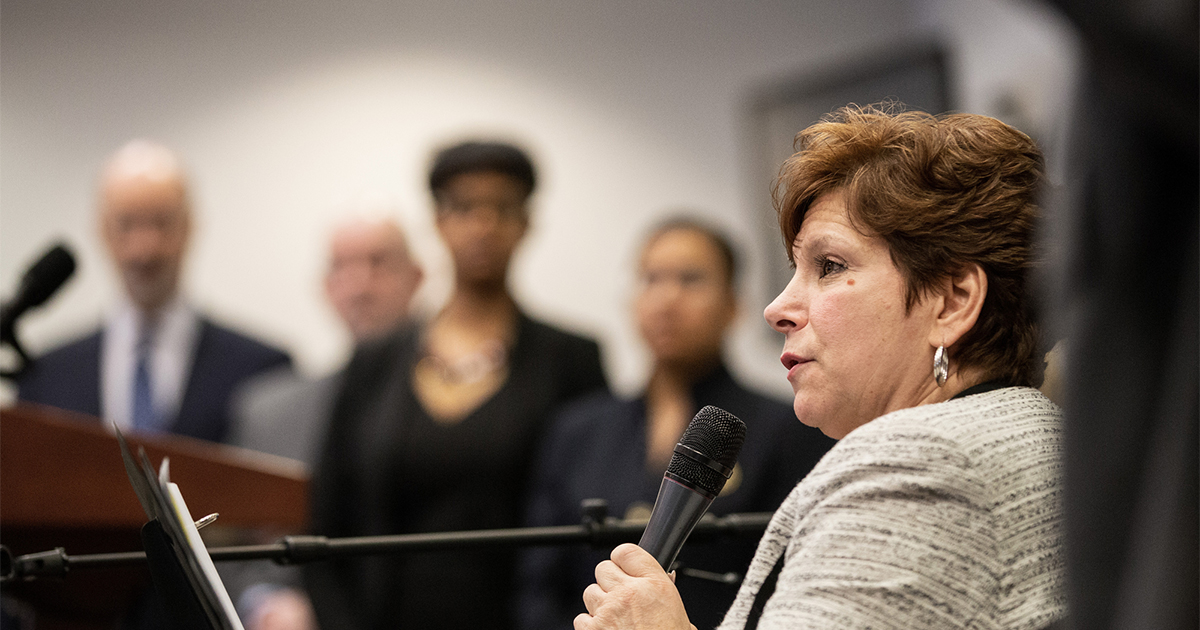
by Christin Brown | Abril 6, 2018 | News Releases
During a news conference at Temple University, Tartaglione highlighted new legislation to expand the protections of PA’s Human Relations Act.
PHILADELPHIA, PA, Abril 6, 2018 – State Sen. Christine Tartaglione yesterday announced new legislation that proposes to add sexual orientation and gender expression as protected classes under Pennsylvania’s Human Relations Act, while expanding the act’s worker protections to include non-employee contractors and unpaid interns.
Sen. Tartaglione’s bill is part of a package of legislation authored by Senate and House Democrats and supported by Gov. Wolf. The governor and legislators announced their initiative at Temple University’s Liacouras Center.
Sen. Tartaglione’s comments appear below:
“Thank you to the Governor, my legislative colleagues and all the public officials who have gathered here to mark this important occasion. Also thank you to the advocates who are fighting on the front lines to prevent sexual harassment and to help victims when sexual harassment does occur.
Believe me, sexual harassment does occur more often than we think and more often than it’s reported.
The focus of my legislation – my part of the package – is to make sure that victims of sexual harassment in the workplace feel empowered to report these incidents and that the law is fully inclusive of the many different people who suffer sexual harassment.
I want workers to understand the protections available to them. I want the reporting process to be easier. I want to protect victims from retaliation by their employer when they do report it.
As we’ve said, this is a BIG problem with many facets. Often, workplace sexual harassment coincides with other discriminatory behavior by a boss or employer. And the victim may be part of more than one protected class – such as age, gender, race, national origin or religion. But consider this for context: in the last six years, the Human Relations Commission has resolved more than 14,500 cases of all types. Among those, more than 12 thousand – that’s 83 percent – involved the workplace.
That’s probably only the tip of the iceberg. For one thing, current law doesn’t classify sexual orientation or gender expression as a protected class. So, if a boss harasses a subordinate because the worker happens to be gay, Pennsylvania’s Human Relations Act may not apply. My bill would add sexual orientation and gender expression as protected classes.
Likewise, current state law doesn’t explicitly protect unpaid interns or independent contractors. This loophole can help an employer avoid accountability not on the merits of a case, but on a technicality. My bill adds those protections for interns and contractors who, for all practical purposes, are employed.
Right now, you may be asking: What’s the advantage of giving a victim access to the Human Relations process? Why can’t the victim just file a civil lawsuit or criminal complaint?
It’s true that federal law mirrors Pennsylvania’s Human Relations Act in many instances. The jurisdictions overlap. But state law gives victims access to potentially faster, sustainable resolutions that satisfy all parties. The PHRC conducts independent, impartial investigations and offers mediation with penalties. If that doesn’t work, violators can be forced to pay uncapped damages. So it’s usually in their best interest to cooperate.
In closing, I’d like to reinforce that this package is just a starting point for meaningful legislative action. We want to do more research on workplace sexual harassment and gather as much information as possible so we can advance prevention and education while continuing to protect victims.”
# # #
Si desea más información sobre este tema, póngase en contacto con William Kenny en el 215-533-0440 o por correo electrónico en [email protected].
by Christin Brown | Junio 2, 2016 | News Releases
PHILADELPHIA, Junio 2, 2016 − State Sens. Christine M. Tartaglione and Shirley M. Kitchen today joined Gov. Tom Wolf for a tour of one of the nation’s leading research centers investigating the causes of drug addiction.
The Center for Substance Abuse Research (CSAR), at Temple University’s Lewis J. Katz School of Medicine, brings together dozens of experts from across Temple campuses to carry out interdisciplinary research to understand the biological basis of drug addiction and other effects of addictive drugs that result in altered states of biological function.
“As we face an opioid overdose epidemic in Pennsylvania, we are fortunate to have the substantial resources of Temple University to approach the problem at the most fundamental level,” Tartaglione said. “It’s inspiring to be in the midst of incredibly talented people doing incredibly important work.”
CSAR recently received a $1 million grant from the National Institute on Drug Abuse to develop and implement an educational program called SEADAP (Science Education Against Drug Abuse Partnership) to teach students in grades 6 through 12 about how commonly abused drugs work in the brain to produce addiction.
“While we face this very serious challenge in our community, it’s encouraging to see that we have the tools here that can lead to success,” said Kitchen, who, for years, has worked closely with the recovery community. “We have the talent right here in North Philadelphia that can help transform lives across Pennsylvania.”
The senators joined the governor on a tour of Temple research facilities and took part in a roundtable discussion about the intersection of academic research and public policy.
After the tour, Wolf, who has made mitigating the opioid crisis a priority for his administration, said the facility is “bringing the power of science to bear on drug abuse and drug addiction.”
“The challenge is how we take the good research that’s going on here and turn it into good public policy,” he said.
Kitchen and Tartaglione recently announced support for a legislative package intended to address the opioid addiction crisis from prevention through recovery. To read details of that effort, click here.
###








